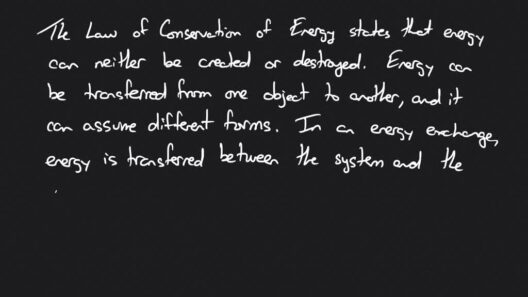In the face of escalating climate challenges, there is a collective urgency to examine our energy consumption patterns. Energy efficiency is central to this dialogue and highlights an often-overlooked facet of environmental stewardship. Conserving energy is not merely a matter of practicality; it encompasses a myriad of benefits that ripple through ecological, economic, and social dimensions. Understanding the rationale behind energy conservation is imperative for fostering a sustainable future.
Discerning the multiple facets of energy efficiency can invoke a sense of responsibility, as well as an appreciation for the underlying system that sustains our daily lives. This exploration acknowledges a common observation: our energy resources are finite and need judicious management.
Environmental Conservation: A Crucial Imperative
The environmental ramifications of energy overconsumption are profound. Dependence on fossil fuels not only exacerbates climate change by increasing greenhouse gas emissions but also depletes natural resources. The immediate impacts are evident—rising sea levels, intensified weather patterns, and biodiversity loss. By prioritizing energy efficiency, we can significantly mitigate these effects.
For instance, energy-efficient technologies, such as LED lighting, high-efficiency appliances, and smart home systems, can dramatically decrease energy demand. A noteworthy example is seen in the transportation sector. Transitioning to electric vehicles (EVs) and improving public transport systems not only decreases dependence on petroleum-based fuels but also curtails harmful emissions. These measures play a pivotal role in enhancing air quality and promoting public health.
Investing in renewable energy sources such as solar, wind, and hydroelectric power further complements energy efficiency initiatives. These resources are inexhaustible and have minimal ecological footprints when appropriately harnessed. As communities worldwide adopt renewable energy solutions, the collective impact can lead to significant reductions in global carbon emissions, contributing positively to mitigating climate change.
Economic Stability: The Financial Incentive
Conserving energy is not solely an ecological necessity; it is also an economically prudent choice. The financial benefits associated with energy efficiency can be staggering. By implementing improved energy practices, households and businesses can realize substantial reductions in utility bills. The Energy Star program, for example, offers guidance on efficient appliances that yield long-term savings. A modest investment in energy-efficient upgrades can result in hundreds, if not thousands, of dollars saved over time.
Moreover, energy efficiency contributes to economic stability by enhancing job creation. The burgeoning green technology sector experienced exponential growth in the last decade, creating millions of jobs focused on renewable energy installation, retrofitting buildings, and improving energy systems. Transitioning towards a sustainable economy necessitates a skilled workforce, ultimately buoying local economies and invigorating job markets.
Governments also play a crucial role in promoting energy conservation through policies and incentives. Tax credits, rebates, and grants for energy-efficient practices are tools that facilitate consumer participation and foster a culture of sustainability. Additionally, regulatory reforms can encourage industries to adopt energy-efficient practices, creating a broader ripple effect across the economic landscape.
Social Equity: Empowering Communities
The intersection of energy conservation and social equity cannot be overstated. Energy efficiency initiatives have the potential to empower marginalized communities disproportionately affected by energy costs and environmental degradation. Ensuring access to energy-efficient technologies and practices can significantly improve the quality of life for many vulnerable populations.
In energy-conscious communities, residents often experience lower energy bills, enhanced living conditions, and improved health outcomes. Moreover, integrating energy efficiency in educational campaigns can elevate awareness about energy conservation, thereby inspiring a collective shift toward sustainable practices within the community.
Moreover, community-driven projects, such as local solar installations or green retrofitting initiatives, can engender a sense of ownership and collaboration. These endeavors not only foster social bonds but also build resilience against economic fluctuations and environmental threats. In essence, investing in energy efficiency transcends economics—it promotes social cohesion and equity across diverse demographics.
The Path Forward: A Collective Responsibility
As we stand at a critical juncture in environmental conservation, there is an imperative to act decisively. Efforts to conserve energy encapsulate our collective responsibility toward the planet and future generations. By adopting energy-efficient practices at the individual, communal, and institutional levels, we initiate profound changes that can culminate in a more resilient and equitable world.
The journey towards energy efficiency requires collaboration among governments, businesses, and citizens. Education plays a pivotal role in this endeavor; promoting awareness about energy conservation techniques and the tangible benefits of efficiency can necessitate widespread participation.
Ultimately, conserving energy is about recognizing the interconnectedness of our actions. The pursuit of energy efficiency goes beyond mere statistics; it represents a conscious commitment to preserving the ecological balance, enhancing economic stability, and fostering social equity. In acknowledging the importance of energy conservation, we are not merely addressing an observation—we are embracing a transformative approach that harbors the potential to reshape our world for the better.








